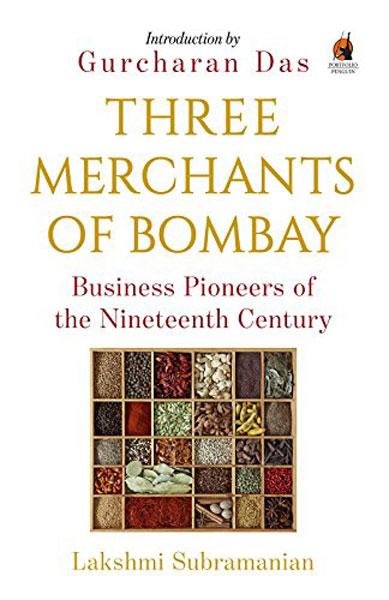
Unlike the British who record every little detail of their lives with supporting documents, Indians used to leave almost everything unrecorded. Even such documents as existed vanished with time, as indeed they are vanishing even as I write. As a result, we know very little of people of consequence before the British conquered India. This is especially true of businessmen.
This volume by Lakshmi Subramanian seeks to fill that gap in a limited measure. She is a well-known economic historian who has specialised in the Western part of India of the 19th century. Here she seeks to put together the lives of three 19th century businessmen of enormous importance in those days.
They are Trawadi Arjunki Nathji, who was a banker in Surat in the late 18th and early 19th century; Jamsetjee Jeejeebhoy, who made his fortune from the opium trade with China and became a very important figure in Bombay; and Premchand Roychand, who was a stock broker and a major trader in cotton, gold and silver.
Trawadi Arjunki Nathji was a Surat-based moneylender-cum-finance-operator or shroff, as they were called in those days. Through the latter part of the 18th century, when the East India Company was slowly replacing the Mughal Empire as the sovereign power and the Marathas as the ruling force, he helped the Company with money which promised and delivered security. Without him, many of the Company’s wars and conquests may not have been possible. He thus became very important in the overall scheme of things. His story is fascinating, even though no one knows how his business slowly disappeared in the first quarter of the 19th century. One thing is, however, well established: he could bend the British to his will, which he did frequently.
Jamsetjee Jeejeebhoy was born in 1783. He wasn’t rich or even well off. His parents died in 1799 and by good luck — and hard work — by the mid-1830s he had built a formidable business in association with William Jardine with whom he had become friends during a shipwreck. Jeejeebhoy traded in many things but it was from the China opium trade that he made his money, huge amounts of it. Later on, he turned into a great philanthropist in Bombay and is remembered as such. He died in 1859. For those who are interested in fictionalised forms of history, Amitava Ghosh’s River of Smoke is based on Jeejeebhoy’s story. He makes the characters come alive in a way that Lakshmi doesn’t but then hers is an academic work.
Premchand Roychand was a speculator, mostly in the stock and land markets. The legend is that whatever he touched turned, if not into gold, then at least into a neat profit. But there are two views about him, says the author. One is that he was a do-gooder; the other is that he used other gullible people to make his fortune. The British also held him highly responsible for the collapse of the Bombay bank. There is no agreement on which view is correct but one thing is beyond dispute: he played a major role in the development of Bombay, including in the area around Elphinstone Circle.
The author has chronicled the lives, achievements and failures of these three Indian businessmen in just the right amount of detail to give the reader a flavour of what happened at that time. The style could have been less academic but that shortcoming is more than made up by the fascinating stories of the lives of these three men and of the overall economic and political context in which they had operated. It is a pity that there was nothing like business press of modern times. Had it been there we would have learnt even more about their lives.





